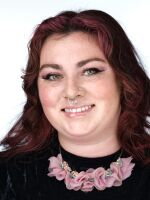University of Delaware professor LaShanda Korley was recently appointed a U.S. Science Envoy, one of seven who will travel the globe to drive research in several sectors.
She says she will embark on around three extended trips to different parts of the globe to build connections and share solutions with other scientists.
Korley says her job, in a nutshell, is understanding how materials organize. She uses spider silk as an example.
“So if you think about natural material systems and how they inspire us to design new materials that function in a different way," she says. "If you look at spiders and the building blocks that enable them to have their specific function, that’s what I do in my lab.”
Her work however, is focused on plastics.
“And thinking about things from bioinspiration, to sustainable materials design and plastics recycling and upcycling,” Korley says.
Korley adds she is interested to learn how other countries have optimized local solutions – and is a big advocate for educational opportunities. She says there is no “one size fits all” solution, and it’s her job to find what works where.
“The plastic waste problem is truly a global issue with impact for everyone," Korley says. "So tackling it is going to require diverse solutions [and] diverse teams working on this across science, technology, [and] policy issues.”
Personally, she notes being a black woman in a STEM field can be a challenge, but is thankful for the strong examples set for her. She says by supporting people who wouldn’t normally sit in these spaces, they can continue to promote diversity and inspire others.
Korley says her job, in a nutshell, is understanding how materials organize. She uses spider silk as an example.
“So if you think about natural material systems and how they inspire us to design new materials that function in a different way," she says. "If you look at spiders and the building blocks that enable them to have their specific function, that’s what I do in my lab.”
Her work however, is focused on plastics.
“And thinking about things from bioinspiration, to sustainable materials design and plastics recycling and upcycling,” Korley says.
Korley adds she is interested to learn how other countries have optimized local solutions – and is a big advocate for educational opportunities. She says there is no “one size fits all” solution, and it’s her job to find what works where.
“The plastic waste problem is truly a global issue with impact for everyone," Korley says. "So tackling it is going to require diverse solutions [and] diverse teams working on this across science, technology, [and] policy issues.”
Personally, she notes being a black woman in a STEM field can be a challenge, but is thankful for the strong examples set for her. She says by supporting people who wouldn’t normally sit in these spaces, they can continue to promote diversity and inspire others.




